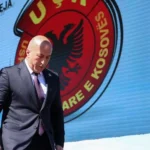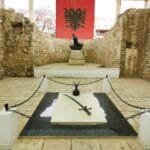In the complex geopolitical landscape of Eastern Europe, the echoes of Ukraine’s struggle for sovereignty reverberate in unexpected corners. Among them is Kosovo, a region with a tumultuous past and uncertain future. Ukrainian journalist Artem Kulya delves into the parallels between the two regions, shedding light on the geopolitical maneuvers and historical narratives that intertwine them.
Kosovo, situated in the heart of the Balkans, has been a focal point of international attention since its declaration of independence from Serbia in 2008. Yet, its path to statehood has been marred by ethnic tensions and geopolitical rivalries reminiscent of Ukraine’s Donbas region.
In a series of exclusive reports, Kulya uncovers the intricate web of propaganda and power plays that define Kosovo’s political landscape. From the presence of Russian-backed militias to the covert maneuvers of Serbian authorities, every move is a chess piece in a larger game of influence.
One striking similarity between the two regions is the presence of “green men” – armed groups with ambiguous allegiances. In Kosovo, these militias, supported by the Serbian government, pose a threat to stability and fuel speculation about Moscow’s intentions.
Kosovo’s struggle for recognition mirrors Ukraine’s quest for sovereignty, with both regions facing resistance from powerful adversaries. Despite being home to a majority Albanian population, Kosovo’s status remains contested, much like Ukraine’s Crimea.
The specter of conflict looms large over Kosovo, with tensions simmering near the border with Serbia. Recent clashes, including a deadly attack on police officers, underscore the fragility of peace in the region.
Amidst the geopolitical maneuvering, Kosovo emerges as a staunch ally of Ukraine, providing support and solidarity in the face of Russian aggression. Ukrainian flags fly alongside Kosovo’s own banner, symbolizing a shared commitment to freedom and independence.
As Kulya’s investigation reveals, the Kremlin’s interest in Kosovo extends beyond regional dynamics. By exploiting historical grievances and sowing discord, Russia seeks to undermine Western unity and expand its sphere of influence.
However, the people of Kosovo are not mere pawns in a geopolitical game. Their firsthand experience of conflict and resistance offers valuable insights into the tactics of propaganda and manipulation employed by hostile actors.
Through diligent fact-checking and investigative journalism, media outlets in Kosovo expose the insidious spread of Russian propaganda. They remain vigilant against attempts to distort reality and incite violence, drawing from their own history of resilience and resistance.
As tensions escalate and the specter of conflict looms, Kosovo stands as a beacon of hope for Ukraine and other nations facing external threats. By sharing their stories and standing in solidarity, they demonstrate that the struggle for freedom knows no borders.







